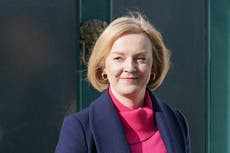Margaret Thatcher’s part in Liz Truss’s spectacular downfall
Liz Truss must take personal blame for driving the economy off a cliff, but she was also victim of a Tory mindset that constantly nagged “What would Maggie do?’ What Truss and her fellow zealots forgot was that Mrs Thatcher was a far cannier – and more cautious – politician than her latter-day tax-slashing tribute act, writes Tim Bale


Liz Truss has been called many things – many of them unprintable. Given what she did to the country’s economy, people’s mortgage repayments and the Tories’ poll ratings, that’s hardly surprising. But it still shouldn’t let her party off the hook.
Obviously, Truss, along with her similarly clever-silly chancellor, Kwasi Kwarteng, can’t wholly escape personal responsibility for what happened. After all, it was ultimately her decision to push through a tax-cutting mini-budget that, together with her refusal to let the Office for Budget Responsibility (OBR) take a look at it first, was almost bound to spook the markets.
Yet to heap all the blame and opprobrium on Truss herself is to understate the extent to which her decisions were a product of a mindset, a curse even, that has afflicted the Conservative Party for well over three decades – namely that the key to solving Britain’s socio-economic problems will always lie in asking – “What would Maggie do?”
In many ways, that reflex is understandable. Margaret Thatcher presided over a profound restructuring of the UK economy that, in some aspects at least, was long overdue and maybe even inevitable. Moreover, she did so against much of the conventional, “establishment” wisdom of the time while winning three general elections on the trot – the first from the opposition and the second and third from the government, and with massive majorities.
Nor, contrary to the arguments of some of Thatcher’s “wet” critics, is it the case that the small-state, deregulatory policies she pursued were somehow out of keeping and kilter with Tory tradition.
Indeed, one can argue – as her supporters frequently did – that she was merely returning to the eternal verities from which her post-war predecessors had either reluctantly (Churchill) or very deliberately (Macmillan) moved away.
There are, of course, more than a few holes in this convenient narrative.
For a start, the party was led for a large part of the pre-war era by Stanley Baldwin – a politician with a decent claim to be the Tories’ first genuinely “one-nation” prime minister.
And then there is the ridiculous idea that the party lost its way after 1990 because it not only dumped Thatcher herself but junked her policies too. Try telling that to anyone who lived through the John Major years – years in which even more of the public sector was privatised while health and welfare were kept chronically short of cash.
Equally, the notion that the tax rises implemented by Ken Clarke, Major’s chancellor (who, by the way, wasn’t seen as half as cuddly and centrist back then as he is now) represented a clear departure from the one true path is nonsense. Thatcher loved to talk about cutting taxes. But she also raised them in order to squeeze out inflation, shift the burden from direct to indirect taxation, and to make it look as if she was balancing the books.
Liz Truss clearly idolised Thatcher – so much so that she attracted plenty of ridicule for supposedly cosplaying the Conservative Party’s first and most successful female leader. Yet her tribute act was even more ideological than it was sartorial. As such, however, it placed her firmly within rather than outside what is now the Tory mainstream – the bog-standard Thatcherism that continues to treat its progenitor as an icon rather than the canny, often cautious and occasionally contradictory politician she really was.
Had the Tories remembered this living, breathing Thatcher instead of placing her on a pedestal, they might still have elected Truss in the summer of 2022. After all, the only realistic alternative to her as a replacement for a broken Boris Johnson was Rishi Sunak – hardly a Mr Charisma with the common touch. But she might have been less likely to have blown up her premiership within a fortnight or so by forgetting that the first woman ever to enter No 10 as prime minister was as much a fiscal conservative as a no-holds-barred state-shrinker.
True, some Tories – most evidently Sunak and those who helped run his leadership campaign – did at least recall (unlike the party in the media to whom the mini-budget initially appeared as manna from heaven) that there was rather more to their icon than simply slashing taxes.
But let’s not rewrite history here. An awful lot of their colleagues turned on Truss and against what she’d done only after it became apparent (admittedly very rapidly) that it had all gone horribly wrong. Had things turned out differently, you can bet they would have hailed her as something like the second coming.
But things did go horribly wrong, and Sunak was drafted – not so much a departure from Thatcherism as simply another variant, and, as such, no less of a dead end than Truss. Unless – and until – the Tories finally move on and develop a truly 21st-century, forward-facing conservatism, then not only the party but the country as a whole looks likely to be stuck in that cul-de-sac forever.
Tim Bale is professor of politics at Queen Mary University of London and author of ‘The Conservative Party after Brexit: Turmoil and Transformation’






Join our commenting forum
Join thought-provoking conversations, follow other Independent readers and see their replies
Comments